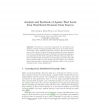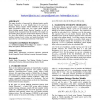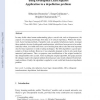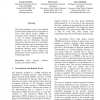1614 search results - page 68 / 323 » Learning Rules and Their Exceptions |
ANLP
1997
14 years 11 months ago
1997
We proposed a method of machine translation using inductive learning with genetic algorithms, and confirmed the effectiveness of applying genetic algorithms. However, the system b...
103
click to vote
NEUROSCIENCE
2001
Springer
15 years 2 months ago
2001
Springer
We propose a theoretical framework for specification and analysis of a class of learning problems that arise in open-ended environments that contain multiple, distributed, dynamic...
CIKM
2005
Springer
15 years 3 months ago
2005
Springer
This paper describes a framework for defining domain specific Feature Functions in a user friendly form to be used in a Maximum Entropy Markov Model (MEMM) for the Named Entity Re...
CORR
2008
Springer
14 years 10 months ago
2008
Springer
In many fields where human understanding plays a crucial role, such as bioprocesses, the capacity of extracting knowledge from data is of critical importance. Within this framewor...
EUSFLAT
2003
14 years 11 months ago
2003
This paper proposes a new novel method for the online construction of a Hierarchical Fuzzy Rule Based System (FRBS) to accurately model a function while retaining a level of human...




